Politics, Memory, and Reality
Americans look back more fondly on the Trump economy than they did in 2020.
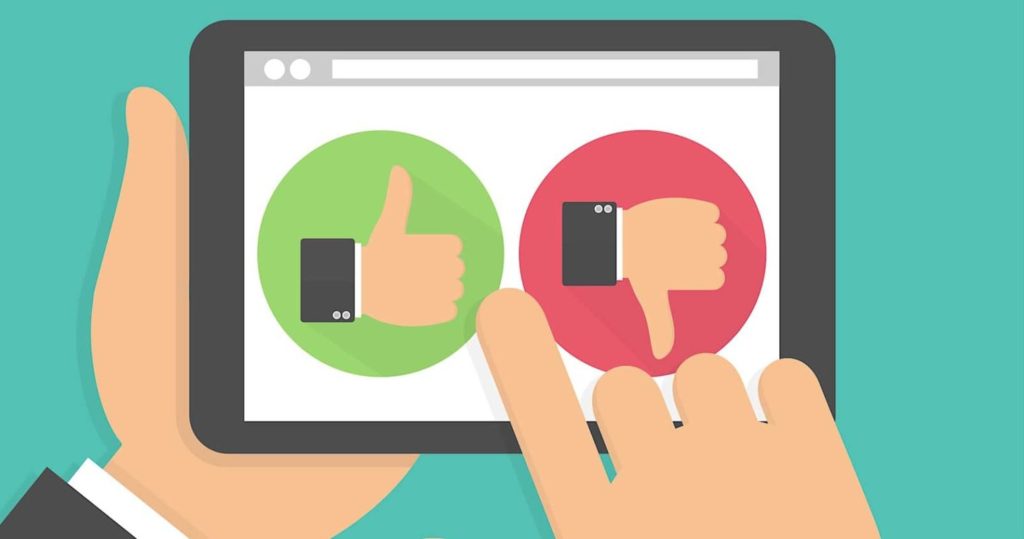
The report “CBS News poll finds Biden-Trump race tight in Michigan, Pennsylvania, Wisconsin” is fascinating not so much for what it tells us about the current state of play in three Rust Belt swing states but about the nature of perception in American politics.
For years, they’ve been three of the handful of states that decided presidential elections. In the summer of 2020, amid the COVID pandemic and lockdown debates, sizable majorities in Michigan, Wisconsin, and Pennsylvania rated state economies badly. Incumbent President Donald Trump trailed in polls, and ultimately, the three close contests were won by challenger Joe Biden.
Four years on, some things haven’t changed. We have the same two candidates locked in close — effectively even — races. And there are still negative views of the economy that now, as then, weigh on the 2024 incumbent, President Biden.
Given the views of these candidates, the summer campaign here might be an argument about who is the less bad option: both candidates elicit more feelings of worry than confidence, more insecurity than security, and plenty of anger.
So, nothing newsworthy there. But here’s where it gets interesting:
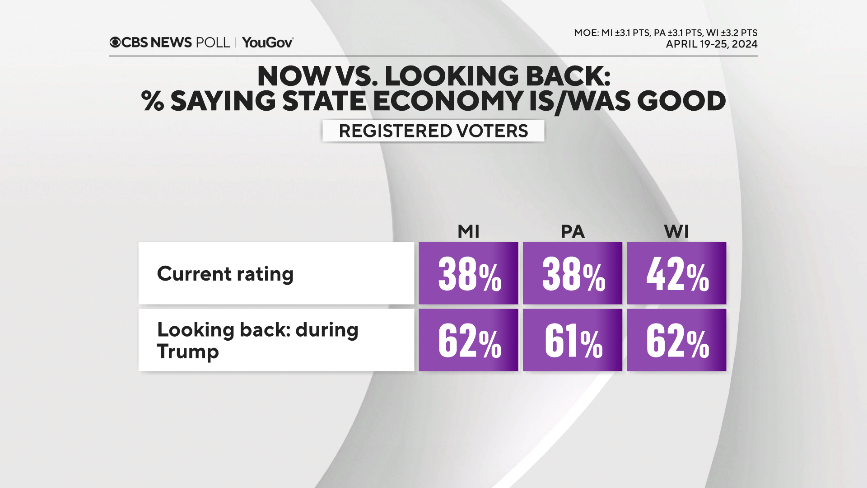
Stipulating that a poll of registered voters in 2024 isn’t by any means a perfect overlap with a 2020 exit poll of actual voters, the wild swing between people’s real-time perception of the economy versus their recollection of it less than four years later is fascinating.
With inflation looming large in their minds, most voters don’t say there’s even been improvement in their state’s economy post-pandemic: only a quarter say it has improved in the years since, with about half saying it has actually gotten worse.
I don’t have time to do a deep dives into the economic reality of these three states but it’s obviously just nonsense that things haven’t wildly improved since the end of the pandemic. And that’s true even if, like me, you don’t assign Trump much of the blame for the downturn or given Biden much of he credit for the rebound.*
And few say their own finances are better compared to before the pandemic. This may be an essential part of their memory — comparing to before the coronavirus.
I suspect this is what is going on here. In 2020, voters punished Trump for the extant reality. In 2024, they think of “The Trump Economy” as the state of play circa 2018-2019.
Amid those poor economic numbers, here’s a change that’s working against Mr. Biden: he narrowly trails Donald Trump on “understands the needs and concerns of people like you.” That means he’s losing an edge he enjoyed in the summer of 2020 when we asked voters in Pennsylvania and Wisconsin this question.
The swing is rather considerable, with Biden down 4 points and Trump up 5 from the 2020 numbers (albeit in a survey with a 3.2 point margin). I find it baffling but, were I to hazard a guess, it’s the lack of major speeches on the economy from Biden.
The choice between Mr. Biden and Trump now predominantly draws out negative feelings like worry and anger.
Twice as many say Mr. Biden makes them feel worried as say he makes them feel either secure or confident. He trails Trump on making voters feel confident and secure.
Trump, for his part, elicits more feelings of anger, which does fuel opposition to him, helping keep Mr. Biden in these races, despite sour economic views.
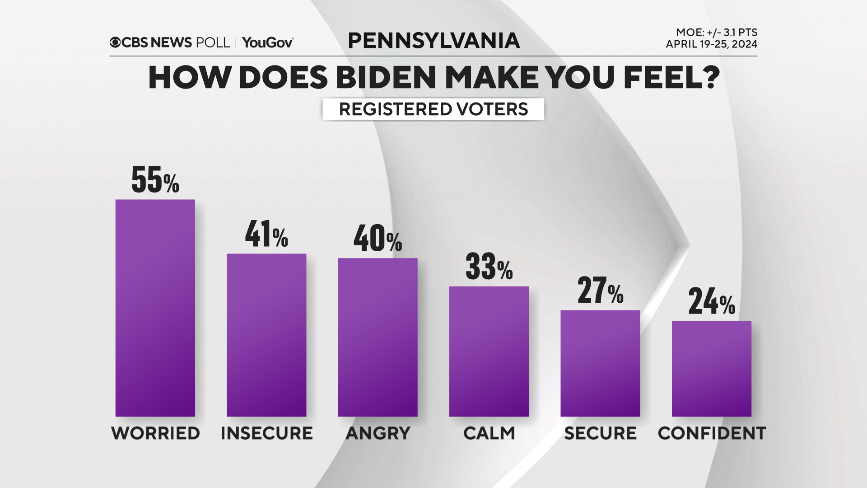
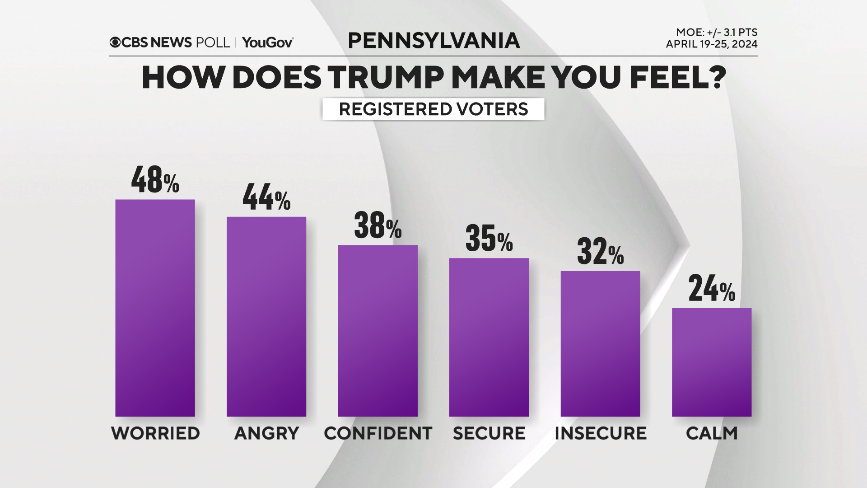
That neither candidate cracks 50 in any of the good categories is more an indicator of our deep polarization than anything else. I’m not sure what to make of the sky-high “worried” reactions to both.
Back to the economy and my main takeaway:
As we’ve seen nationwide, voters today recall their state’s economy “when Donald Trump was president” quite differently from the way it was viewed back in 2020, specifically. Ratings of the economy were quite low that year. So it may well be that when they think back about the Trump years, they’re thinking back to before the pandemic. That matters a lot for how they perceive their choice of Trump and Mr. Biden now.
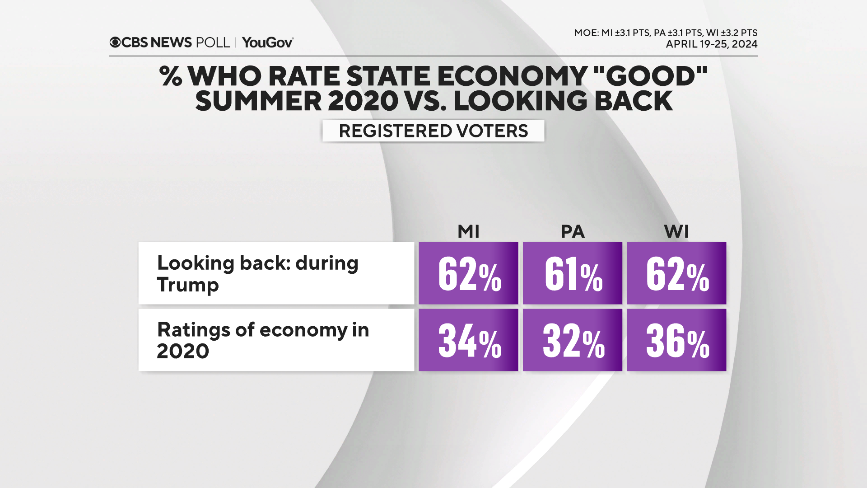
Thinking in retrospect about the economy under Trump while skipping over the pandemic in 2020 lends itself to a more favorable comparison with the economy now, under Mr. Biden. Moreover, many voters say their own finances today are worse than during the time before the pandemic.
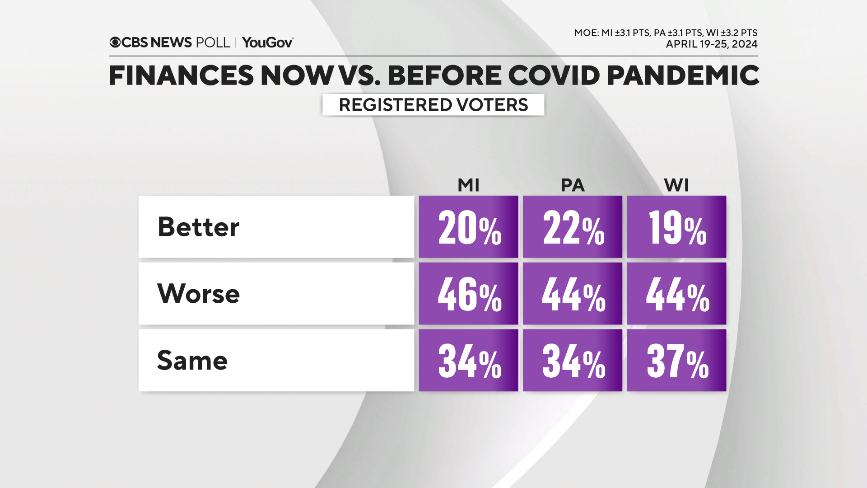
And so, today we find plenty of voters want to change back: in all three states, many believe they would be financially better off with Trump back in office. Voters who feel this way are voting for him in large numbers.
Again, none of this is rational. People’s feelings are at odds with not only the economic data but their own real-time perception of the economy. But, of course, that doesn’t matter. They feel what they feel and it’s up to Biden and company to change their mind.
*Trump wildly mismanaged the crisis in all sorts of ways but the economic hit was global. Biden gets modest credit for pumping so much money into the economy, albeit quite possibly so much so that it overheated, leading to inflation and higher interest rates.

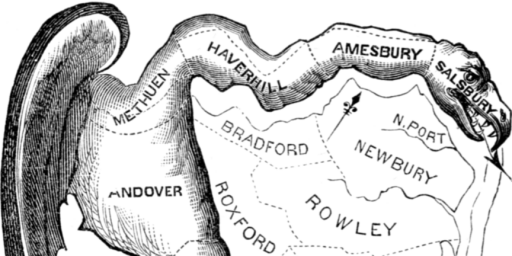
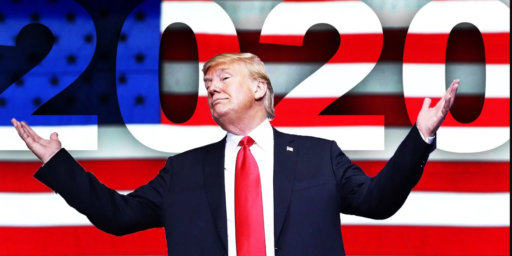

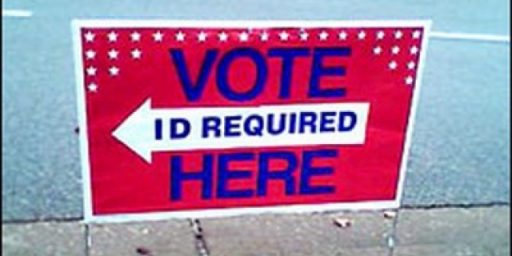
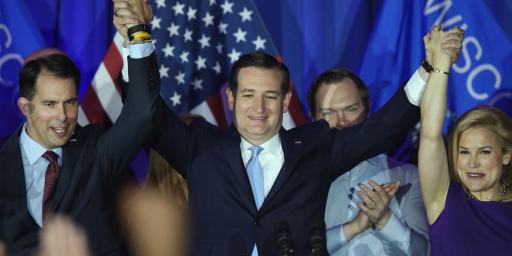
This is 100% wrong on causality. Most voters who say they feel this way were, I would guess, predisposed to vote for him – that is, they’re already Trump supporters and would tell you he could manage zebra farts better than Joe Biden if you asked. You’d find the same with Biden supporters. The reality is that neither of these guys is going to move the needle much (personally) on the economy short of a major disaster…something like, I dunno, the general destruction of the current government in favor of a semi-autocratic regime or something like that.
We’re probably talking about 5% who are actually moving to the other side based on something like this. (I won’t even go into the structural issues involved, and what a horror show journalism is when it comes to reporting on the economy in general.) Social policy is still the real wedge, followed by personal cash flow, but people dress it up with broader economics (and foreign policy too!) all the time. “Do I want fewer black neighbors and a big tax cut? No no no, Trump would just be better with the economy!”
Side note: I wonder how much these polling numbers reflect the honesty of each party, or if both partisans are equally dishonest about their motives.
Perhaps relevant from NBC discussing a new poll,
That those with a college education tend D while those without tend R may be some sort of difference in culture or in class interests. Or it could just be that the better educated understand better.
Frustrating and depressing, but not particularly surprising. Magical thinking is sort of an American pastime at this point. Combined with a lack of curiosity/understanding of how the economy works, you end up with myopic voters equating (global) inflationary pressures–that are compounding factors–with whomever is in office.
I might need to stop reading news/posts like this from now until November. I don’t think my blood pressure can take this.
@gVOR10:
Understand better, have a wider field of view and care more. It is fascinating, though not at all surprising, the degree to which IQ/education is becoming as important an identifier as race or gender.
The MAGA people are largely evangelicals, the dimmest of religious bulbs. I can’t speak to the reliability of this data, but Episcopalians, Jews and Atheists have a ten point IQ edge on Baptists.
Since inflation was also global, and the US has actually done better on the inflation front.
Other note: the irony of the retrospective memories about ~2018 is that in terms of economic policy, people are remembering quite a bit about the policy effects of the Obama admin and not the Trump admin, since policy effects take time to come into place.
@Michael Reynolds:
It may be the Homer Simpson Effect, stated succinctly as “If things that happen to stupid people keep happening to you, it means you’re not smart enough to asses your level of stupidity.”
The Media as a collective whole want nothing more than another Trump term —- including the FTFNYT and WaPo in addition to CBS/NBC/ABC.
However, unfortunately for them, each and every election somehow as if by magic brings another monkeystomping for the party that has come out of the closet with their desire to eliminate personal rights.
This “story” is presented as some sort of Both Sides Equal Grouping and.. who could have possibly predicted that page 2 question 8 of the Michigan file reveals that exactly 1% of the polled group plan to vote for Biden. Either go find a group where 50% of the group votes for each party or…. there isn’t a story.
Feelings are feelings so not much you can do about it. Pretty clear that Trump fans want to remember only the good years/parts and ignore the bad ones.
Steve
@Gavin:
Your evidence for that being . . . ?
You’re misreading the question. Question 6 is “If he 2024 presidential election were being held today between Joe Biden, the Democrat, and Donald Trump,the Republican, who would you vote for?” It’s 51 Biden, 49 Trump, 1 other. Question 8 is asking those who say they support Trump whether they might consider switching. And, shockingly, only 7 percent would.
It’s three years and people are looking back fondly on the Trump years. We may be fucked if he doesn’t get convicted, and might be even if he does. I used to think the reason for his popularity was “he hates the right people”, and nothing else. But a lot of people really believe he is some type of economic genius, and all immigration is bad. And fascism just doesn’t scare people, a large amount of the American population is comfortable with an authoritarian government because it will fix all the problems.
Trump tells people he will take revenge on his enemies, and people see that as normal.
A lot of the economic numbers don’t capture the enshittification that we all experience on the regular, and actually report the grifter economy as a good thing (if a fool parts with a dollar, the GDP goes up).
Products are worse and smaller, and the shopping experience is worse. That has an effect.
If you go to Target and see everything behind glass or with an antitheft device bolted on*, it doesn’t feel like you are doing well.
Also, while inflation has stabilized, and wages have risen to match — there are a whole lot of winners and losers in the process among the working classes, as there’s a lot more individual variation in wages than prices. The losers (non-pejorative) rightly think that the economy is doing worse for them.
Plus, there’s the whole idea that a banana costs $X that you’ve grown to know for decades, and if it is now $X+Y, it’s going to feel expensive even if $X+Y is a smaller percentage of your current income.**
None of this seems like a mystery to me. The blame may be pointed in the wrong direction, but it’s not a mystery why people are feeling bad. They’re feeling bad because for a large number of them, shit is bad.
(Also, housing prices — both purchase and rental. And I hear there is a whole lot more bullshit finding a job. And my industry has been enjoying performative layoffs, so a lot of upper-middle-class software engineers are feeling antsy)
If Republicans had figured out how to nominate a less-visibly-insane candidate, they would be wiping the floor with Biden right now.
——
*: Did major retailers make a conscious decision to make a larger portion of America feel like they are in a lower-class neighborhood? Was it done with the intent of hurting Democrats’ election prospects, and keeping corporate taxes low?
**: eventually the line “It’s a banana, Micheal, what could it cost? $10?” will lose its punch. That will be sad.
To my mind, the responses on economics aren’t particularly baffling. I suspect most people contextualize the question as “how am I doing, as you noted earlier in the piece. Moreover, I would guess that most Americans, and especially retired ones (i.e. the kind of Americans who routinely talk to pollsters), are pretty well at whatever economic apex they will achieve. Or, as Walt Kelly’s possum would put it, “from here on up it’s downhill all the way.” (And if I recall correctly, a not too recent comment from you noted in passing that you were realizing that your own and your wife’s incomes will drop pretty precipitously when you both retire.)
For most of us, to quote the great contemporary philosopher Carly Simon, “These are the good old days.” We’re living in the nicest houses we’ll ever own, driving the newest cars we’ll ever have, and are as comfortable as we’ll ever be–short of retiring in the Third World, where even I would be rich. If asked, I usually respond that I see the economy as about the same despite the fact that I was priced out of my last apartment and will be priced out of this one eventually, provided that I live long enough. But I can also suspect that people living in the bottom three quintiles may not be a sanguine as I am. So, no, the polls on economics don’t mystify me. If they mystify others, I would suggest that said others might wish to recalibrate their position in the pecking order. There are quite a few of us who imagine we are “middle class” when we are significantly better off than that. A place to start might be to Google “10 things the middle class can’t do anymore.”
“A lack of major speeches” would be far down my list of potential causes of voter sentiment about anything, but especially the economy. Americans have been subjected to relentlessly negative reporting about the economy since Biden took office. Even good news stories were usually qualified by “but most economists expect a recession soon”, until that was no longer a tenable observation. Monthly/quarterly unemployment/GDP figures are no longer reported within a historical context; the benchmark now is the vague “economists’ expectations” which are meaningless to most people. Consequently despite the lowest sustained unemployment for 50 years, large numbers of Americans continue to believe unemployment is a major problem. And of course scary stories about inflation have been a frequent media feature for three years, regardless of the fact that the inflation rate in recent months has been comparable to those throughout the Reagan, Clinton and Bush years.
When one of two major parties insists the economy is going to hell, and a lot of the media either agrees or at least minimises positive news, it’s no wonder lots of people believe it. No self-serving presidential speeches would change the situation.